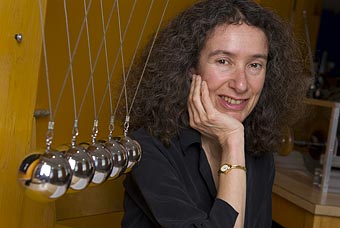A father’s legacy will help future students
After her father died two years ago, Ellen Zweibel received an inheritance. She wasn’t quite sure what she would do with it, but the UW–Madison professor knew she would like to help others.

"I think it matters for students to know that anyone cares about
keeping them in school, especially a faculty member," says Ellen Zweibel. "They
see this other side of us, where it might seem to them sometimes that
we’re creating obstacles for them. I believe it’s important for them to
see that we care about making education accessible regardless of means."
Her father, John Gould, had emphasized education. "He didn’t have a college degree, for a combination of financial and family reasons," says Zweibel, who teaches and conducts research in physics and astronomy in the College of Letters and Science. "He fostered my curiosity, and he always encouraged me to be interested in science and the world.
"I wanted to do something to memorialize him in some way," she adds. "He was a refugee from Czechoslovakia during the Nazi era. I thought about helping refugees, but I was not really sure what to do."
So Zweibel turned her thoughts to funding young people’s dreams. "I have been reading so much about how the cost of education is pricing so many people out of the market," she says. "I’m very proud to be a faculty member here. I’m very proud of the education we can offer people. I want it to be as accessible as possible."
She met with development staff at the University of Wisconsin Foundation and discovered a new initiative that would match her gift dollar for dollar if it went to unrestricted, need-based student support. The foundation’s board of directors has made $20 million available to match such gifts. (Endowment funds of $25,000 or more for need-based scholarship gifts restricted to colleges or similar units are being matched 50 cents on the dollar.)
"I am in two departments — astronomy and physics — and my father liked chemistry," Zweibel says. "So my first thought was a scholarship for a student in one of those fields, but when it was explained that there was this match, I made no restrictions. That was just too good to pass up."
Soon thereafter, Zweibel set up the first faculty-supported, need-based scholarship endowment as part of the "Great people. Great place." initiative.
"I didn’t know whether the amount of money I was talking about would matter," she says. "I didn’t know if you needed half a million dollars to walk through the door. I was surprised to discover that a relatively modest amount of money can make a big difference. Would a $1,000 or $2,000 grant make a difference to a student, given that it’s less than tuition? I’m sure now that it does."
She looks to her own past for an indication of how financial times have changed. "My mother became a high school teacher shortly before I went to college," says Zweibel, who grew up in New Jersey. "Her take-home pay was about three times the cost of room, board and tuition at the University of Chicago, where I went as an undergraduate. That’s just staggering, for a place that now I think costs close to $50,000 a year. The cost of education compared with wages and salaries had just gone up so much.
"Considering the kinds of jobs my parents had — my mother being a teacher, my father being a tool and die maker — with three kids, they could never have sent all three of us to private schools," she adds. "Education transforms people on the outside and on the inside. It makes such a difference in what you can do in life."
Zweibel believes there’s another good reason for faculty members to support students. "I think it matters for students to know that anyone cares about keeping them in school, especially a faculty member," she says. "They see this other side of us, where it might seem to them sometimes that we’re creating obstacles for them. I believe it’s important for them to see that we care about making education accessible regardless of means."
As for her feelings about the use of that inheritance: "There certainly were other things I might have done with it," she says. "Setting up this scholarship has brought me nothing but happiness."
Subscribe to Wisconsin Ideas
Want more stories of the Wisconsin Idea in action? Sign-up for our monthly e-newsletter highlighting how Badgers are taking their education and research beyond the boundaries of the classroom to improve lives.




